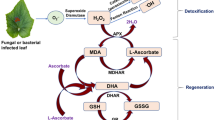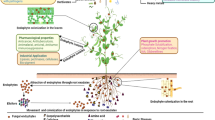Abstract
We describe the use of plant-made β-defensins as effective antimicrobial substances for controlling salmonellosis, a deadly infection caused by Salmonella typhimurium (referred to further as S. typhi). Human β-defensin-1 (hBD-1) and -2 (hBD-2) were expressed under the control of strong constitutive promoters in tobacco plants, and bio-active β-defensins were successfully extracted. In the in vitro studies, enriched recombinant plant-derived human β-defensin-1 (phBD-1) and -2 (phBD-2) obtained from both T1 and T2 transgenic plants showed significant antimicrobial activity against Escherichia coli and S. typhi when used individually and in various combinations. The 2:1 peptide combination of phBD-1:phBD-2 with peptides isolated from T1-and T2-generation plants reduced the growth of S. typhi by 96 and 85 %, respectively. In vivo studies employing the mouse model (Balb/c) of Salmonella infection clearly demonstrated that the administration of plant-derived defensins individually and in different combinations enhanced the mean survival time of Salmonella-infected animals. When treatment consisted of the 2:1 phBD-1:phBD-2 combination, approximately 50 % of the infected mice were still alive at 206 h post-inoculation; the lowest number of viable S. typhi was observed in the liver and spleen of infected animals. We conclude that plant-made recombinant β-defensins (phBD-1 and phBD-2) are promising antimicrobial substances and have the potential to become additional tools against salmonellosis, particularly when used in combination.




Similar content being viewed by others
References
Aerts AM, Thevissen K, Bresseleers SM et al (2007) Arabidopsis thaliana plants expressing human beta-defensin-2 are more resistant to fungal attack: functional homology between plant and human defensins. Plant Cell Rep 26:1391–1398. doi:10.1007/s00299-007-0329-4
Ajesh K, Sreejith K (2009) Peptide antibiotics: an alternative and effective antimicrobial strategy to circumvent fungal infections. Peptides 30:999–1006. doi:10.1016/j.peptides.2009.01.026
Allen GC, Flores-Vergara MA, Krasynanski S et al (2006) A modified protocol for rapid DNA isolation from plant tissues using cetyltrimethylammonium bromide. Nat Protoc 1:2320–2325. doi:10.1038/nprot.2006.384
Benincasa M, Pelillo C, Zorzet S et al (2010) The proline-rich peptide Bac7(1-35) reduces mortality from Salmonella typhimurium in a mouse model of infection. BMC Microbiol 10:178. doi:10.1186/1471-2180-10-178
Bradford MM (1976) A rapid and sensitive method for the quantitation of microgram quantities of protein utilizing the principle of protein–dye binding. Anal Biochem 72:248–254
Carsiotis M, Stocker BA, Holder IA (1989) Salmonella typhimurium virulence in a burned-mouse model. Infect Immun 57:2842–2846
Chen H, Xu Z, Peng L et al (2006) Recent advances in the research and development of human defensins. Peptides 27:931–940. doi:10.1016/j.peptides.2005.08.018
Coburn B, Grassl GA, Finlay BB (2007) Salmonella, the host and disease: a brief review. Immunol Cell Biol 85:112–118. doi:10.1038/sj.icb.7100007
Dey N, Maiti IB (1999) Structure and promoter/leader deletion analysis of mirabilis mosaic virus (MMV) full-length transcript promoter in transgenic plants. Plant Mol Biol 40:771–782
Donald CD, Sun CQ, Lim SD et al (2003) Cancer-specific loss of beta-defensin 1 in renal and prostatic carcinomas. Lab Invest 83:501–505
Fink SL, Cookson BT (2007) Pyroptosis and host cell death responses during Salmonella infection. Cell Microbiol 9:2562–2570. doi:10.1111/j.1462-5822.2007.01036.x
Ganz T (2003) Defensins: antimicrobial peptides of innate immunity. Nat Rev Immunol 3:710–720. doi:10.1038/nri1180
Ganz T, Selsted ME, Szklarek D et al (1985) Defensins. Natural peptide antibiotics of human neutrophils. J Clin Invest 76:1427–1435. doi:10.1172/JCI112120
Garabagi F, McLean MD, Hall JC (2012) Transient and stable expression of antibodies in Nicotiana species. Methods Mol Biol 907:389–408. doi:10.1007/978-1-61779-974-7_23
Gebreyes WA, Thakur S, Davies PR et al (2004) Trends in antimicrobial resistance, phage types and integrons among Salmonella serotypes from pigs, 1997–2000. J Antimicrob Chemother 53:997–1003. doi:10.1093/jac/dkh247
Gomord V, Faye L (2004) Posttranslational modification of therapeutic proteins in plants. Curr Opin Plant Biol 7:171–181. doi:10.1016/j.pbi.2004.01.015
Grassl GA, Valdez Y, Bergstrom KSB et al (2008) Chronic enteric salmonella infection in mice leads to severe and persistent intestinal fibrosis. Gastroenterology 134:768–780. doi:10.1053/j.gastro.2007.12.043
Hancock REW, Sahl HG (2006) Antimicrobial and host-defense peptides as new anti-infective therapeutic strategies. Nat Biotechnol 24:1551–1557. doi:10.1038/nbt1267
Harder J, Bartels J, Christophers E, Schroder JM (2001) Isolation and characterization of human beta-defensin-3, a novel human inducible peptide antibiotic. J Biol Chem 276:5707–5713. doi:10.1074/jbc.M008557200
Kovaleva V, Kiyamova R, Cramer R et al (2009) Purification and molecular cloning of antimicrobial peptides from Scots pine seedlings. Peptides 30:2136–2143. doi:10.1016/j.peptides.2009.08.007
Krishnakumari V, Singh S, Nagaraj R (2006) Antibacterial activities of synthetic peptides corresponding to the carboxy-terminal region of human beta-defensins 1–3. Peptides 27:2607–2613. doi:10.1016/j.peptides.2006.06.004
Lehrer RI, Lichtenstein AK, Ganz T (1993) Defensins: antimicrobial and cytotoxic peptides of mammalian cells. Annu Rev Immunol 11:105–128. doi:10.1146/annurev.iy.11.040193.000541
Li J, Raghunath M, Tan D et al (2006) Defensins HNP1 and HBD2 stimulation of wound-associated responses in human conjunctival fibroblasts. Invest Ophthalmol Vis Sci 47:3811–3819. doi:10.1167/iovs.05-1360
Liu L, Wang L, Jia HP et al (1998) Structure and mapping of the human beta-defensin HBD-2 gene and its expression at sites of inflammation. Gene 222:237–244
Markeeva N, Lisovskiy I, Lyzogubov V et al (2005) Expression of beta-defensin-2 in human gastric tumors: a pilot study. Exp Oncol 27:130–135
Mason HS, Warzecha H, Mor T, Arntzen CJ (2002) Edible plant vaccines: applications for prophylactic and therapeutic molecular medicine. Trends Mol Med 8:324–329
Meena A, Bansal P, Kumar S (2009) Plants-herbal wealth as a potential source of ayurvedic drugs. Asian J Tradit Med 4:152–170
Murashige T, Skoog F (1962) A revised medium for rapid growth and bioassays with tobacco cultures. Physiol Plant 15:473–497
Nakashima H, Yamamoto N, Masuda M, Fujii N (1993) Defensins inhibit HIV replication in vitro. AIDS 7:1129
Patro S, Kumar D, Ranjan R et al (2012) The development of efficient plant promoters for transgene expression employing plant virus promoters. Mol Plant 5:941–944. doi:10.1093/mp/sss028
Perron GG, Bell G, Quessy S (2008) Parallel evolution of multidrug-resistance in Salmonella enterica isolated from swine. FEMS Microbiol Lett 281:17–22. doi:10.1111/j.1574-6968.2007.01045.x
Poppe C, Ziebell K, Martin L, Allen K (2002) Diversity in antimicrobial resistance and other characteristics among Salmonella typhimurium DT104 isolates. Microb Drug Resist 8:107–122. doi:10.1089/107662902760190653
Presicce P, Giannelli S, Taddeo A et al (2009) Human defensins activate monocyte-derived dendritic cells, promote the production of proinflammatory cytokines, and up-regulate the surface expression of CD91. J Leukoc Biol 86:941–948. doi:10.1189/jlb.0708412
Quiñones-Mateu ME, Lederman MM, Feng Z et al (2003) Human epithelial beta-defensins 2 and 3 inhibit HIV-1 replication. AIDS 17:F39–F48. doi:10.1097/01.aids.0000096878.73209.4f
Ranjan R, Patro S, Pradhan B et al (2012) Development and functional analysis of novel genetic promoters using DNA shuffling, hybridization and a combination thereof. PLoS One 7:e31931. doi:10.1371/journal.pone.0031931
Salzman NH, Ghosh D, Huttner KM et al (2003) Protection against enteric salmonellosis in transgenic mice expressing a human intestinal defensin. Nature 422:522–526. doi:10.1038/nature01520
Schardl CL, Byrd AD, Benzion G et al (1987) Design and construction of a versatile system for the expression of foreign genes in plants. Gene 61:1–11
Schneider JJ, Unholzer A, Schaller M et al (2005) Human defensins. J Mol Med (Berl) 83:587–595. doi:10.1007/s00109-005-0657-1
Seon J, Szarka S, Moloney M (2002) A unique strategy for recovering recombinant proteins from molecular farming: affinity capture on engineered oilbodies. Plant Biotechnol J 4:95–101
Shai Y (2002) Mode of action of membrane active antimicrobial peptides. Biopolymers 66:236–248. doi:10.1002/bip.10260
Shimoda M, Ohki K, Shimamoto Y et al (1995) Morphology of defensin-treated Staphylococcus aureus. Infect Immun 63:2886–2891
Soruri A, Grigat J, Forssmann U et al (2007) beta-Defensins chemoattract macrophages and mast cells but not lymphocytes and dendritic cells: CCR6 is not involved. Eur J Immunol 37:2474–2486. doi:10.1002/eji.200737292
Stevenson JE, Gay K, Barrett TJ et al (2007) Increase in nalidixic acid resistance among non-Typhi Salmonella enterica isolates in the United States from 1996 to 2003. Antimicrob Agents Chemother 51:195–197. doi:10.1128/AAC.00222-06
Sun L, Finnegan CM, Kish-Catalone T et al (2005) Human beta-defensins suppress human immunodeficiency virus infection: potential role in mucosal protection. J Virol 79:14318–14329. doi:10.1128/JVI.79.22.14318-14329.2005
Threlfall EJ, Ward LR, Frost JA et al (2000) Spread of resistance from food animals to man—the UK experience. Acta Vet Scand Suppl 93:63–74
Tiwari S (2008) Plants: a rich source of herbal medicine. J Nat Prod 1:27–35
Twyman RM, Stoger E, Schillberg S et al (2003) Molecular farming in plants: host systems and expression technology. Trends Biotechnol 21:570–578. doi:10.1016/j.tibtech.2003.10.002
Vaazquez F, Gonzaalez EA, Garabal JI et al (1996) Development and evaluation of an ELISA to detect Escherichia coli K88 (F4) fimbrial antibody levels. J Med Microbiol 44:453–463. doi:10.1099/00222615-44-6-453
Valore EV, Park CH, Quayle AJ et al (1998) Human beta-defensin-1: an antimicrobial peptide of urogenital tissues. J Clin Invest 101:1633–1642. doi:10.1172/JCI1861
Wu S, Lu R, Zhang Y, Sun J (2010) Chronic salmonella infected mouse model. J Vis Exp doi: 10.3791/1947
Young AN, de Oliveira Salles PG, Lim SD et al (2003) Beta defensin-1, parvalbumin, and vimentin: a panel of diagnostic immunohistochemical markers for renal tumors derived from gene expression profiling studies using cDNA microarrays. Am J Surg Pathol 27:199–205
Zasloff M (2002) Antimicrobial peptides of multicellular organisms. Nature 415:389–395. doi:10.1038/415389a
Acknowledgments
We are grateful to the Council for Scientific and Industrial Research, Govt. of India for financial support [Project No. 38(1268)/10/EMR-II to ND], Fellowship (20-6/2008 (ii) EU-IV) to SP and ILS/Core fund to ND. We sincerely thank the Director, Institute of Life Sciences, Bhubaneswar, for his constant inspiration and suggestion for pursuing this study. We are grateful to Prof. T. Ganz for providing the cDNA clones of hBD-1 and hBD-2 and to Dr. D.V Singh for providing the bacterial strains. We also thank Mr. Sukumar Purohit for his kind help in performing the mice experiments and Ms. Vineeta Rai for providing the transformed control plant used in this study. The technical support provided by Mr. Abhimanyu Das is gratefully acknowledged.
Conflict of interest
None.
Author information
Authors and Affiliations
Corresponding author
Additional information
Sunita Patro and Soumitra Maiti have contributed equally to this work.
Rights and permissions
About this article
Cite this article
Patro, S., Maiti, S., Panda, S.K. et al. Utilization of plant-derived recombinant human β-defensins (hBD-1 and hBD-2) for averting salmonellosis. Transgenic Res 24, 353–364 (2015). https://doi.org/10.1007/s11248-014-9847-3
Received:
Accepted:
Published:
Issue Date:
DOI: https://doi.org/10.1007/s11248-014-9847-3




